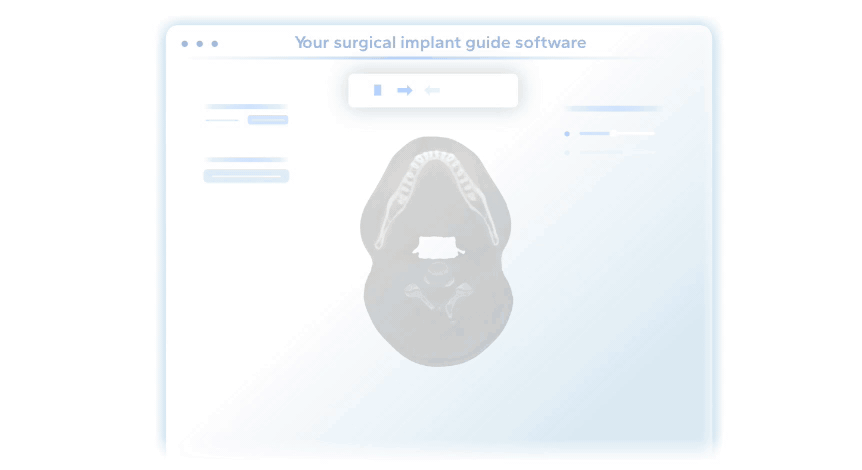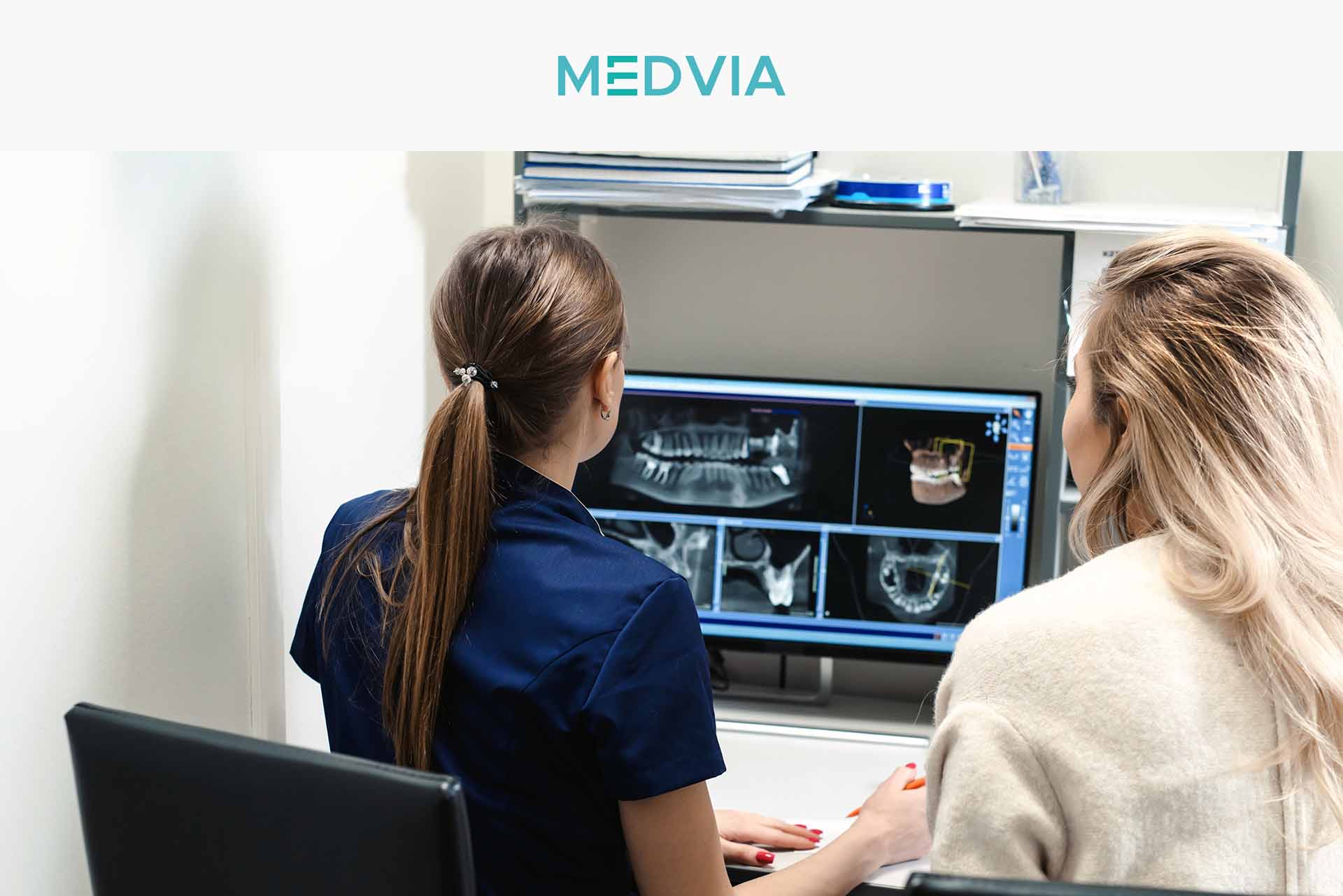The dangers of surgical shortcuts
Our teeth go through a lot in our lifetimes – daily wear and tear, sports injuries, gum disease – so they don’t always make it to our older years. In the EU, nearly 2 million dental implants are installed annually, and the numbers are steadily increasing. But 1 in 10 dental implants result in complications requiring follow-up care. The best way to avoid such failures is for the dental surgeon to conduct presurgical planning.
Reinhilde Jacobs is a specialist in this kind of planning. A professor in the Department of Imaging & Pathology, KU Leuven, Reinhilde started out as a dental surgeon with a specialty in implant dentistry. She later obtained a specialization in dental maxillofacial radiology. “Presurgical planning of implant placements is my passion, and something which we developed here at KU Leuven in the 1990s,” she says. “An implant can be placed anywhere in the jaw bone, but one has to care not to touch the trigeminal nerve, particularly in the lower jaw (mandible). Damaging this cranial nerve is life devastating and cannot be cured.”
“Nerve damage during dental surgery could mean lifelong pain or numbness. Presurgical planning can help to avoid this kind of complication.” – Reinhilde Jacobs
So if presurgical planning for dental implants gives patients a better outcome, why don’t all dentists do it? Jacobs explains that the main issue is time: standard presurgical planning can take a few hours per patient, and must fit into an already full working day. “For us at the university, it was no problem – we can take the needed time because our business model provides us this flexibility. But in private practice it’s different: every minute of every hour has to be accounted for. We saw that many dentists were not doing this presurgical planning, and the result was a rise in complications for patients.”
AI to the rescue
Artificial Intelligence (AI) has come into its own over the last few years and is being used more commonly in a variety of fields, including medicine. The AI used in the AIPLANT project has been developed by Relu, a young Belgian startup. The inclusion of this AI can reduce preoperative planning from what would typically take an hour or more into a few minutes. Not only do dental practitioners gain additional information and support, they also save valuable time.
“With the accessibility of AI in medicine, we can now create a virtual patient and simulate implant surgery,” Jacobs explains. “The AI is used as a dental assistant to help plan the surgery as accurately as possible. Because it can show you the potential complications in advance, you can anticipate them before surgery.”
“AI compensates for the human factor by providing reliability and consistency.” – Reinhilde Jacobs

A new process
In preparation for use on real patients, the AI platform has been trained to understand human mouth and jaw structures. To do this, the dentists and dental surgeons taking part in the project have compiled CT scans as well as other imaging modalities from many patients to create patient models. Now that these models have familiarized the platform, the AIPLANT team is developing smart algorithms to guide dental practitioners in their surgical planning.
Thomas Beznik, one of the co-founders and Chief Product Officer for Relu, explains how the implant algorithm would work in practice. “We start by detecting the anatomy of the patient in the given scans. That information is then fed to the implant AI which uses smart algorithms, the dentist’s preferences, and clinical knowledge that we developed together with the oral and maxillofacial surgery (OMFS) group, to determine the ideal implant position and dimensions. This ideal position is one that mitigates risks for the patient, so sufficiently far from the nerve, from other teeth, from the sinus, etc., and ensures maximal stability and longevity of the implant.”
Dental practitioners can choose their own preferences with regards to using certain types of implants or abutments (the support component of an artificial tooth), their dimensions, and the implant system. “Based on the patient information and the implant details selected by the practitioner, the AI will calculate the implant’s ideal position and then the dentist can approve or suggest changes, if needed,” says Beznik.
Read this interview to find out how Science for Health is challenging Belgians to embrace technology for innovative healthcare!
So not only is this AI program patient-specific, it is also practitioner-specific. In addition to incorporating different implant types and characteristics into its calculations, a variety of surgical planning options can be made depending on whether a single implant is being prepared or multiple, or whether the implant is in an aesthetic region (generally considered the teeth in the front and center of the mouth) or further back.
Two specialties are better than one
In her dental radiology role with UZ Leuven’s OMFS, Jacobs has been working with engineers since she started at the university in the ‘90s. “Here in Leuven, we collaborated with engineers of varying disciplines, mostly from the university. This allowed us to take a pioneering role with 3D imaging, creating virtual patients to simulate implant surgery before starting with real patients. This strategy helped to avoid nerve damage and other problems that might occur during surgery. Our university philosophy is really good – there’s always a lot of interaction between medicine, dentistry and engineers. It’s a real two-way exchange and it’s together that we have advanced.”
For the AIPLANT project, Relu connected with OMFS through projects at the university, with a helping hand from MEDVIA. “The cluster organizes a lot of events that have helped Relu connect with both partners and investors, which is so valuable,” says Beznik. “We got in touch with Xentro Dental, the third partner on the AIPLANT project, through MEDVIA.”
“There is a willingness of the dental specialists at UZ Leuven to innovate, really pushing to be cutting edge, and there’s investment to move forward. They are a good partner for Relu.” – Thomas Beznik
The founding members of Relu met during their civil engineering studies at KU Leuven and, following the completion of their Master’s degrees, set up an AI consulting company. “AI was the given when we started because we were all very passionate about it,” Beznik shares. “Four years ago, it was still rather new – not many people had expertise in that area, so we wanted to help companies, and decided to start with a focus on medical. Through various projects with OMFS, we discovered the dental field. It was so interesting to us because you have different scans, different types of imaging that we could work with. We really like the space.”
This collaboration between dental experts and AI specialists, together with a supportive ecosystem for innovative medical developments, can help dental surgeons around the world provide better care to their patients, and improve patient outcomes from surgery. Intelligent dentistry, indeed.


